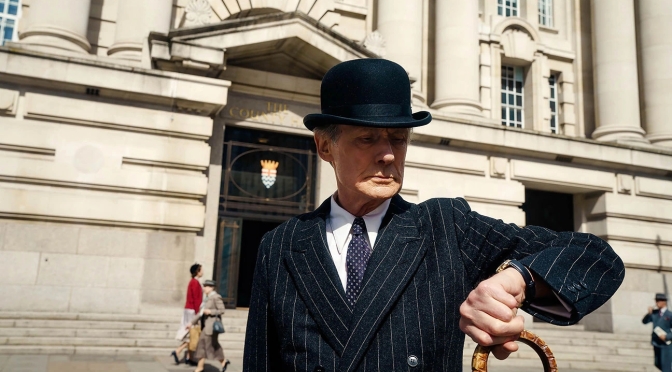★★★★★
Bill Nighy really does give the performance of his career in Living. This being the Oliver Hermanus directed adaptation of 1951 Kurosawa classic Ikiru, which was itself drawn from Tolstoy novella ‘The Death of Ivan Ilyich’. The pedigree of pen continues here, with none other than Kazuo Ishiguro behind the script. It’s a surprisingly easy segue from the Japanese mannerisms of Kurosawa’s film to the particularly British sensibilities of Hermanus’ 1950s setting. Visually, this is achieved via truncated period ratios, a fine grain and gorgeous attention to detail. Though melancholia haunts proceedings, it’s not hard to find reservoirs of joy in the film’s performances and faith in the power of an individual to make change happen. The final shot, though borrowed, is perfection.
Translating Ikiru to Living proves a meticulous transaction and Ishiguro’s faith to this source, rather than that of Tolstoy, is tangible. Not that the film is enslaved. Nighy’s role is as was Rashomon’s Takashi Shimura’s in Ikiru: that of a sedentary bureaucrat and devotee to a monotonous daily routine. One decades in the making. As was Shimura’s Kanji Watanabe, Nighy’s Mr. Williams is a bereaved widower, ill treated by his semi-estranged son and testy daughter-in-law with whom he lives. In divergence from Ikiru, Living finds Ishiguro and Hermanus introduce their lead via the surrogacy of a third party. This is Alex Sharp’s Mr. Wakeling, who is warned by identikit employees of London’s County Hall that his superior is ‘a decent sort, if a little on the frosty side’. Sharp is excellent.
So cool an exterior, of course, hides a raging magma of torturous introspection. Nighy excels in this. Lowering his vocal range and distinctive diction, in favour of a softer and more distracted tone, Nighy proves extraordinarily adept in portraying the live and undulating emotions of a suppressed soul. It’s a wealth of feeling that never quite breaks the skin. ‘I don’t have time to be angry’ he tells an astonished colleague in the face of one battle. A wonderful scene in the twilight of the film sees messers Middleton (Adrian Rawlins), Rusbridger (Hubert Burton), Hart (Oliver Chris)and Wakeling attempt to wrestle with all that is known about Mr. Williams, all that is guessed and all that will go with him to the grave.
And therein lies the crux of the whole. It’s a heartbreaking and barely spoken exchange that uproots all. The implication is clear and the now terminal Mr. Williams gifts only ‘Quite’ as response and insight into the mind of a man in total free fall. Suddenly, the skyscraper towers of paperwork, petitions and proposal flanking his desk – and so exquisitely framing Nighy as a visual conceit – feel all too real as shackles.
A fleetingly salubrious escape to the coast proves no comfort, no matter how gamely his guide – Tom Burke’s ‘smutty and trivial’ Mr Sutherland – seeks to show Williams a good time. Instead, it is under his own nose that accidental wisdom is found. Sex Education’s Aimee Lou Wood plays the naïvely winning Miss Harris, Williams’ one time clerk, whose zest for life – and knickerbocker glories – is infectious. Having fled the mindless rotations of County Hall already, Miss Harris is the pure model of living for which Mr. Williams strives. There’s well written awkwardness in their connection – and the twitching of curtains it provokes – but the chemistry is stellar.
In the absence of words, Living finds expression in the craft of its own creation. A gently hypnotic score by Emilie Levienaise-Farrouch ripples beneath the action – or inaction – gliding between the momentum of piano soliloquies and the almost alarming string spirals. It’s romantic and delightfully tied to a time and period, heightened further by the 1:33:1 ratio and lush painterly lens. Though the film opens in the height of Summer, cinematographer Jamie Ramsay follows a seasonal flow directed by mood and narrative flow. Autumnal hues tone the opening third before a sharp rush of green preempts the shock that is the arrival of winter. Ishiguro’s script, though mining new themes and ideas, takes its cue from that of Kurosawa, Shinobu Hashimoto and Hideo Oguni in twisting the tale rather sooner than expected towards a more melancholic but innately thought provoking final third.
T.S.


